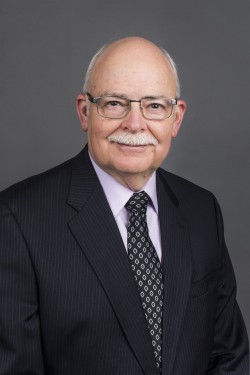News | June 1st, 2016

[Editor’s note: the following transcript has been edited for length and clarity.]
As we approach election time in North Dakota, we hear and read stories about voters affected by the state’s Voter ID law passed in 2013 and altered in 2015. As we approach the June 14 primary, how does the state respond to that criticism? And just what exactly do you need to be able to vote that day and later in the November general election?
To get answers, HPR sat down with longtime ND Secretary of State Al Jaeger, a Republican who has been in office since 1993 and oversaw the Voter ID law’s passage. He has come under fire from state Democrats about this law and the subsequent ad campaign last election cycle, that voting in the state is “easy as pie.”
Is it? Decide for yourself. We hope these answers will help you educate yourself about what you need to do to be able to vote. Plan ahead and regardless of your disagreements with the law, make sure you do what is required before election day, or ask questions so you don’t get sent home without being able to vote.
High Plains Reader: It’s been a few years since the Voter ID law was passed. Why do you think there are still some issues with it?
Al Jaeger: I don’t know that there are issues. Over 95% of voters use a North Dakota-issued driver license as their main source of identification, particularly for voting purposes. The process is very simple. They just need to make sure to check their driver license, to see if the address where they are living matches their address on their driver license; and if it doesn’t, they need to contact the Department of Transportation.
They can do that either online or by making a telephone call, and have their address changed to the address of their residency. They don’t necessarily have to replace their driver license itself. But they do need to have their correct residential address reflected to the DOT, and they will be able to vote very easily.
HPR: Some of the questions I have heard have been from students trying to vote and Native Americans trying to vote. Students aren’t sure how long they are going to be at a given address from school year to school year, so they are reluctant to change the address on their ID in the summer, because they don’t where they will be living in the fall.
AJ: Essentially the voter needs to live in their voting precinct at least 30 days prior to the election so if they are living in an address and have been for 30 days prior to the election, that’s the one they can use. It needs to be a North Dakota-issued driver license. If a student is from out of state, we will strongly encourage that they apply for an absentee ballot from the state that they reside in, where their identification is from, their driver license, and not wait until the last minute -- do it now.
For a North Dakota resident, it’s quite likely that they could have a different residence now, and in the fall they also could have a different residence. In the fall they could just go online again and make that change.
For a lot of students, if they have a North Dakota-issued driver license and they are going to a college in a different town from where they reside, we’d also encourage them to vote back home.
A lot of college students don’t change the address on their driver license until probably after they graduate. They continue to use their parent’s home and if that’s the case, we would encourage that they apply for an absentee ballot and have it mailed to them so that they can cast their ballot, and it would be where their residency is. If they are still claiming residency at their parents’ home, then that’s the one that they certainly can use.
So it’s just a choice that the voter needs to make: where is it that I reside? Once they’ve decided that, they just need to have the record reflect that.
HPR: I have heard some Democrats in the state say that you in the past have encouraged students to keep their old address and vote in that district, even if they don’t live there anymore.
AJ: They have to have a North Dakota-issued identification, that’s the simple part. If they don’t, they are not eligible to vote in North Dakota.
The thing I get concerned about is it’s the law right now, and it shouldn’t be a partisan issue. Those that are concerned about the law should be educating their constituents in terms of what the requirements of the law are. Tell them this is what it is right now. Even though we may not agree with it, this is the way it is, and we’d like for you to vote, and we hope that you’ll vote for us. It’s a pretty simple process really.
HPR: What did you make of that NDSU study which said 3.6% of students were turned away from the polls in 2014. Did you agree with that assessment?
AJ: I don’t agree with that at all, that study and the mathematical formula that they used. If there were that many students turned away, we certainly would have heard about it. It was an academic projection that I believe has no merit at all. It doesn’t reflect the reality of what really happened.
But again, if that is a concern, we certainly encourage them to think ahead. They can’t just show up on election day and say oh, I want to vote. If they want to vote, they are going to college, they’re young adults, and it’s a pretty simple choice that they have to make. They have to think ahead. They can’t leave it until the last minute.
HPR: Was there a reason you didn’t allow student IDs in the law?
AJ: Basically that was an option that existed two years ago. At that time, the Secretary of State was given two options and it was one of the options that we used. The Legislature removed the options available to the Secretary of State so it’s pretty straightforward in terms of the four types of identification that can be used for voting purposes and I think that was probably a wise decision on their part.
It should be clearly spelled out in law what the requirements are and not at the whim of whoever happens to be the Secretary of State, as to what is accepted or not accepted and so that’s why the law is very simple.
It’s four types of identification. You make the decision as to what fits the best for you: the driver license or a state-issued non-driver license; the certificate for those that are in long-term care facilities -- that’s covered very clearly in the law.Tthe Native American population can either use their state identification, which many of them have, or a tribal identification as long as it provides the three critical things that are needed: their birthdate, their name and where they reside.
HPR: On the Native Americans, some of those old tribal IDs lack a street address. What would you say to those people that want to vote and only possess those?
AJ: Over the years, very few actual tribal members have used the tribal identification. Those have been part of the law since 2005. Our records show that very few tribal members use them. We have in the past met with all tribal governments and we cannot dictate what format their identification needs to be. We have suggested that it be as simple as something written on tribal stationary, that lists the individual’s birthdate, name and residential address. But that’s a call of the tribal governments, how they want to provide that identification and what source of documentation that they want to provide. It can be as simple as information on the letterhead of the tribal government.
HPR: The other thing that I’ve heard is that there are no state offices that provide driver licenses on reservations.
AJ: The state has 53 counties. Among those counties are 27 motor vehicle locations that service all of the state’s residents regardless of where they might live, as it relates to their driver license. It’s not unique at all to the reservations. It’s that the DOT does not have an office in every county.
HPR: The other thing I have heard said as far as the law is that voter fraud isn’t that widespread in the state. That was the reason the law was created, voter fraud, and it’s not as rampant as it was made to seem.
AJ: Under the previous situation that we had, where people had completed voter affidavits, it was not very easy to determine the residency of people after the fact. They would be able to cast their ballot and then when there was any verification process afterwards, it really was not very easy to do; and so we don’t know if there was voter fraud. Myself, as a voter, I just want to know that the person that’s voting in the booth next to me is also a qualified voter.
There are so many things that we need identification for in this world. Almost everything that we do requires some type of identification. I don’t understand the argument that it’s okay not to have some proper form of identification. That should be one of the very basic things that assures that the voting process is fair and open to all of us, so that there is no doubt that the people who are voting are qualified voters.
HPR: Finally, one of the things that’s said is that these voter ID laws were created all across the country by Republicans in a deliberate effort to reduce turnout and disenfranchise minority and student voters, who traditionally vote Democrat in higher numbers.
AJ: I disagree with that. I can’t speak for 49 other states, I can only speak for North Dakota. Do you know that it’s more difficult to get a hunting license than it is to get identification for voting? That was passed by Republicans and Democrats, bipartisan and with no dissenting votes. So to somehow say that voter ID laws are to disenfranchise students or anybody else, they aren’t. All it is, is a requirement that you provide identification that matches where you live. I don’t know how much more simple you can get than that.
I disagree with all of the disenfranchisement arguments. Students are intelligent young people. We want them to vote. I encourage them to vote. But they just need to follow the procedures. The underlying reason is to make sure that the people are who they say they are, and that they are eligible to vote, and that they reside where their identification says they reside.
YOU SHOULD KNOW
If you have questions about what you need to be able to vote in the June 14th primary in North Dakota, you can reach the Secretary of State’s office in North Dakota on the web athttp://sos.nd.gov/
June 9th 2025
April 30th 2025
April 24th 2025
April 23rd 2025
April 21st 2025
__293px-wide.jpg)

_(1)__293px-wide.jpg)


__293px-wide.jpg)